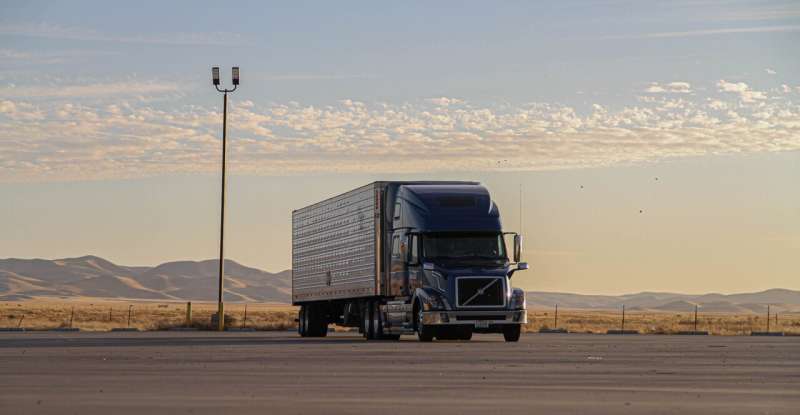This article has been reviewed according to Science X's editorial process and policies. Editors have highlighted the following attributes while ensuring the content's credibility:
fact-checked
trusted source
proofread
Calculations predict that a large proportion of trucks in Denmark will run on electricity within the next 10 years

The transition to electric cars is well underway. At the turn of the year, Denmark reached 200,000 registered electric cars, and last year electric cars accounted for 36% of all newly registered cars. However, the figure is quite different for electric trucks.
Electric trucks only make up about 1% of the total truck fleet in Denmark. However, according to new calculations, this figure will soon change significantly. In fact, calculations predict that the transition from fossil fuel trucks to electric trucks will overtake the transition for passenger cars in Denmark.
"In all the scenarios we have calculated, it appears that the transition from diesel to electric trucks will overtake the transition from fossil fuel cars to electric cars. We have tested different scenarios, and they all indicate that the percentage of trucks running on electricity will be much higher than that for passenger cars within the next 10 years," says Jeppe Rich, Professor at DTU Management, who together with Assistant Professor Ahmed Karam have made the calculations.
If you look at the climate figures, the transition will be significant. On EU roads, heavy vehicles weighing more than 12 metric tons account for more than 25% of greenhouse gas emissions. This is why the European Commission has introduced stricter CO2 emission standards for heavy-duty vehicles, aiming for a reduction of 45% by 2030 and 90% by 2040, compared to 2019 levels.
It is precisely the heavy vehicles on which DTU Management's calculations are based. More specifically, semi-trailer trucks—trucks weighing more than 12 metric tons with one trailer attached—that transport goods within Denmark. Semi-trailer trucks make up about 33% of trucks in Denmark, but account for about 67% of the kilometers driven.
"Specifically, we have looked at a line haul network, where trucks transport goods from one warehouse to another before smaller vehicles pick up the goods and bring them to the cities. These are the trucks that the calculations predict will all run on electricity by 2035," says Jeppe Rich
Among other organizations, the Green Transition Denmark (Rådet for Grøn Omstilling) also predicts a major transition, and estimates that about half of the trucks in Denmark will run on electricity in 2035, while the Danish Energy Agency only expects that about a fifth of the trucks will run on electricity by then.
Complicated equation
The calculations are based on multiple factors that can influence the speed of the transition.
One of the political aspects that could have an impact is the new road charges and tolls that will enter into force in 2025. Trucks weighing more than 12 metric tons will from 2025 have to pay tolls according to their mileage in Denmark. The toll will be differentiated according to the trucks' CO2 emissions, which means that green trucks will have to pay the least.
"The speed of the transition depends, among other things, on whether there will be enough fast chargers and better batteries, truck prices, and the political aspects in the form of charges. If we imagine that the development goes as planned with the upcoming taxes and fast chargers, we believe that a full transition to electric is possible within the next ten years. However, this will require investment in the industry," says Ahmed Karam.
In addition to the savings by going green on the roads, new charging parks will also motivate the industry to run on electricity. In Denmark, almost DKK 700 million is being invested in a roll-out plan, which includes the establishment of 25 charging parks with 175 fast-charging stations. According to the plan, the first five charging parks will open in 2025, while the remaining 20 will be established continuously until 2030.
Is the industry ready?
Despite the many incentives for the transition, it first and foremost requires that companies themselves prioritize electric trucks over the fossil ones.
"We have had conversations with several stakeholders in the industry who confirm that the development trends towards electric trucks. But we have also talked to others who are more conservative and just need to see if the new trucks will be able to work in practice. What is certain, however, is that they feel pressure from their business partners who want CO2-free shipping. So, of course, it's a question of price and competitiveness. Looking at the numbers, it appears that truck battery prices will fall, which will make the trucks more financially attractive," says Jeppe Rich.
Elsewhere at DTU, other solutions are being developed to organize electricity production, so it can meet the increasing charging needs. This is done through the EU innovation project Begonia, which together with companies in the industry is looking at new solutions.
"The companies running large parcel centers state that the smaller trucks transporting the goods the final kilometers in the cities will be the first to transition to electricity. I'm not so sure that things will be as rapid for large trucks, where I sense a certain skepticism from hauliers. But as batteries improve, the large trucks will also run on electricity at some point," says Henrik Madsen, Professor at DTU Compute, who is working on the Begonia project.
















